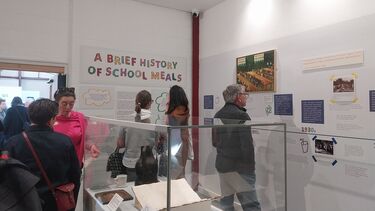A new School Dinners exhibition, created in collaboration by researchers from the University of Sheffield, brings the mixed memories and tastes of school food to life.
The exhibition, launched at The Food Museum in Suffolk on Tuesday 1 April 2025, offers visitors the opportunity to learn about the history of school dinners from the 1940s to the present day, and try tasters of dishes from decades gone by.
The exhibition brings together archival artefacts, multimedia content, oral histories, and contemporary voices - including work by school children - to tell a multi-generational story of school meals. It celebrates the people behind the meals, including the iconic school dinner ladies, and connects personal memory to wider questions of policy and care.
Researchers from the Universities of Sheffield, Wolverhampton and University College London have played a central role in shaping the School Dinners exhibition, as part of the collaborative Economic and Social Research Council (ESRC)-funded School Meals project, ‘The UK School Meals Service: Past, Present, and Future?’
Co-led by Institute for Sustainable Food member, Dr Heather Ellis from the School of Education at the University of Sheffield, the School Meals Project is the official academic partner for the exhibition. The team have contributed historical research, oral history interviews, and thematic guidance to ensure the exhibition reflects the richness and diversity of school food experiences across the UK.
The School Meals Project focuses on the UK School Meals Service - one of the country’s oldest and most far-reaching public welfare initiatives- exploring the history and lived experiences of school meals in the UK. The project examines how school meals have shaped childhoods, communities, and public policy from the early 20th century to the present day. A key aim of the project is to learn lessons from the past in order to inform future school meals policy.
The team’s research has shown that school meals are much more than a nutritional service. They are embedded in wider social, emotional, and cultural structures. School meals shape children's attitudes to food, wellbeing, and identity, and are often remembered vividly and emotionally across generations.
Drawing on oral histories, school-based ethnography, and archival research, the team have uncovered how successive waves of policy reform have often been short-term, fragmented, and reactive, leading to significant regional inequalities. The project research also highlights the complex, multifaceted impact of school meals on individuals and communities. The school dining space is not just about eating - it is a site of care, discipline, socialisation, and sometimes stigma.
Speaking about the project, Institute for Sustainable Food member and Co-Investigator for the School Meals Project, Dr Heather Ellis, said “The clarity and emotional intensity of people’s memories of school meals, even decades later, was striking. Interviewees vividly recalled specific foods, smells, and routines, as well as the emotional landscapes surrounding them - feelings of care, exclusion, or pride. We were also surprised by how much of the current debate around food provision echoes long-standing structural problems. Many challenges seen today - patchy provision, stigma, and the strain placed on school staff - have deep historical roots.”
The team’s research shows that the school dinner lady, in particular, emerges as a powerful figure: friend, counsellor, social worker, liaison between home and school - and, on occasion, even providing ad hoc dental treatment. This work highlights the unseen labour and care practices embedded in everyday school food routines, often carried by low-paid, predominantly female staff. This is a powerful reminder of the social infrastructure that underpins public welfare and the importance of placing lived experience at the centre of policy making.
The School Meals Project research has informed parliamentary debate and public discussion, contributed to educational resources used in over 1,300 schools, and reached millions through BBC Bitesize. Through sustained engagement with the All-Party Parliamentary Group for School Food, the Parliamentary Office of Science and Technology (POST), and civil servants across government departments, the project has directly shaped national conversations about school food provision. In the longer term, it is contributing to draft policy proposals and supporting the case for coherent, centralised reform grounded in lived experience. The project exemplifies how collaborative, historically grounded research can generate lasting public benefit by contributing to more inclusive, equitable, and effective public service delivery.
In recognition of the team’s work designed to highlight the uneven histories of Britain's changing cultural and demographic make-up and school meals provision, as well as the importance of involving children in designing school meals policy, the School Meals project was shortlisted as a finalist for the Children's Food Awards 2025.
The School Dinners exhibition will run until 25 February 2027. It is expected to attract thousands of visitors annually and forms a key part of the project’s public engagement and impact strategy.


